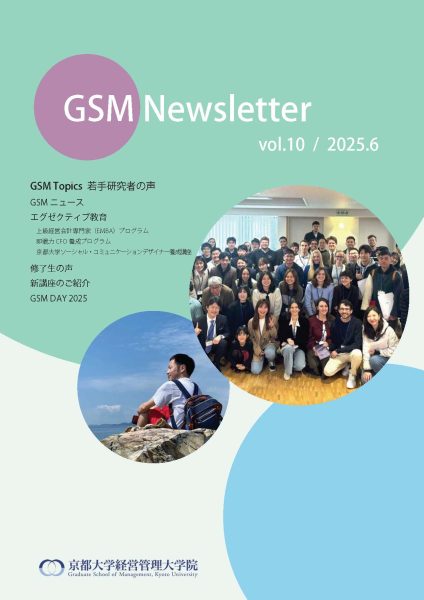Topics
Interview
News
- Media Jan 31, 2026 Forbes Publishes Article by Adjunct Professor Anis Uzzaman on 2026 Technology Trends
- Exchange Dec 17, 2025 GSM Student Participated in the Study Abroad Fair at Peking University
- Research Dec 6, 2025 Paper by Associate Professor Ting Liu, Professor Tomoki Sekiguchi, and Co-authors Published in the Journal of Management Studies
- Admission Nov 17, 2025 Admissions 2026 intake: Kyoto-Cornell Collaborative Degree (Second Round)
- Information Sep 30, 2025 Fall 2025 Student Welcome Reception and Kickoff
Events
-
International Collaboration
-
Students with Work Experience
-
Student Background
Collaborative Research
Center for Research in Business Administration
Endowed Chairs
- Mizuho Securities Endowment (Corporate Finance & Capital Markets)
- City and Town Management by Public-Private Partnerships
- Integrated Port Logistics Chair
- Road Asset Management Policy Chair
- Management Accounting Endowment Research Center (Japan Institute of Management Accounting Professionals)
- Philosophical Entrepreneurship Studies
- International Mega Infrastructure Management Policy Chair
- Integrated Hospitality (Green House) Endowed Chairs
- Plutus Cosulting
- Private Equity (Polaris Capital Group) Endowment
- Art, Communication Design and Organizational Management
- Brain Healthcare Business Ecosystem
- Green Entrepreneurship Studies
- Resilience Studies Endowed Chair
- Endowed Chair in Startup M&A
- Nihon M&A Center HD endowed chair
- Leadership in Accounting
- Project Management Evaluation Chair
- UACJ Endowed Chair
- United Managers Japan Inc. Endowed Chairs
- Curation Theory, Practice and Management Endowed Chair






